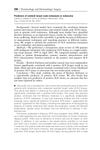Tumor Cell Adhesion as a Risk Factor for SLN Metastasis and Predictor of Disease Recurrence in Primary Cutaneous Melanoma
April 2016
in “
Journal of Investigative Dermatology
”

TLDR Tumor cell adhesion is linked to higher risk of SLN metastasis and melanoma recurrence, and a model including these factors predicts these outcomes better than one with just clinical data.
The document presents a multi-institutional study that aimed to identify new molecular risk factors for sentinel lymph node (SLN) positivity and melanoma recurrence. The study involved next-generation sequencing and quantitative PCR to discover gene clusters with functional roles in melanoma metastasis, which were then quantified in over 700 consecutive melanoma samples from unique patients. The outcomes of interest were SLN biopsy metastasis within 90 days of melanoma diagnosis and disease recurrence after the initial work-up phase. The study developed a model that included both molecular (gene expression variables) and clinicopathologic variables (patient age, Breslow depth, and tumor ulceration) to predict the likelihood of SLN metastasis and disease recurrence. The model that incorporated cell adhesion-linked gene expression variables, such as ß3 integrin, laminin B1, tissue-type plasminogen activator, and tumor-protein 53, performed significantly better than the model based solely on clinicopathologic variables. This improved model may help identify patients with SLN metastases within 90 days of melanoma diagnosis and those at risk for disease recurrence.



